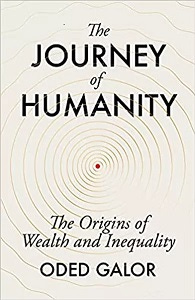The Ancient Roots Of Wealth Inequality
A wonderful new book -- The Journey Of Humanity - uncovers the deep and surprising roots of modern economic performance.
Why are some countries rich and some poor? And why is wealth distributed so unevenly?
Oded Galor, my latest guest on the Top Traders Unplugged podcast, believes we must travel back to the beginning of human culture to find the answers.
Find that difficult to believe?
Listen to the short clips from our interview below and read my review of his new book, The Journey Of Humanity, in Forbes:
Culture
Culture evolves to reflect the initial geographic and climate conditions faced by ancient humans. Over time culture is passed down through generations even when those initial conditions no longer matter. This was a fascinating example:
The more women participate in the economy, the better the economy does. Listen to Galor talk about how this “gender bias” is related to whether or not ancient farmers used the plow in agriculture:
How gender bias is linked to the use of the plow for farming (1 minute)
Diversity
When cultures, races and religions mix it can foster wonderful creativity and innovation. Sadly, it can also generate tension and conflict. In the Middle Ages, avoiding conflict – Galor calls this “social cohesiveness” - mattered more than innovation. Now, innovation is key to generating wealth.
Galor thinks the U.S. is currently “optimally diverse” and future societies may need to become still more diverse to meet the demands for new technologies.
U.S. diversity is optimal for economic growth (40 seconds)
He thinks China risks being left behind because it lacks the diversity to generate the innovation that modern economics rely on.
China must generate more diversity or risk being left behind (50 seconds)
Can We Escape Our History?
The Journey Of Humanity uncovers and explains the ancient the roots of today’s economic circumstances. Does this mean that history is “fate”? Galor says no.
His work gives us a template to design different approaches to generating growth that acknowledge these different historical paths:
History influences on our economy but it is not fate (55 seconds)
If these ideas whet your appetite for more, the link to the full interview is below:
Full discussion of The Journey Of Humanity, with Oded Galor
All the best
Kevin
You Might Also Like:
Can Economists Learn From The Boston Celtics?
Reasons To Be Optimistic About The Economy And The Environment

